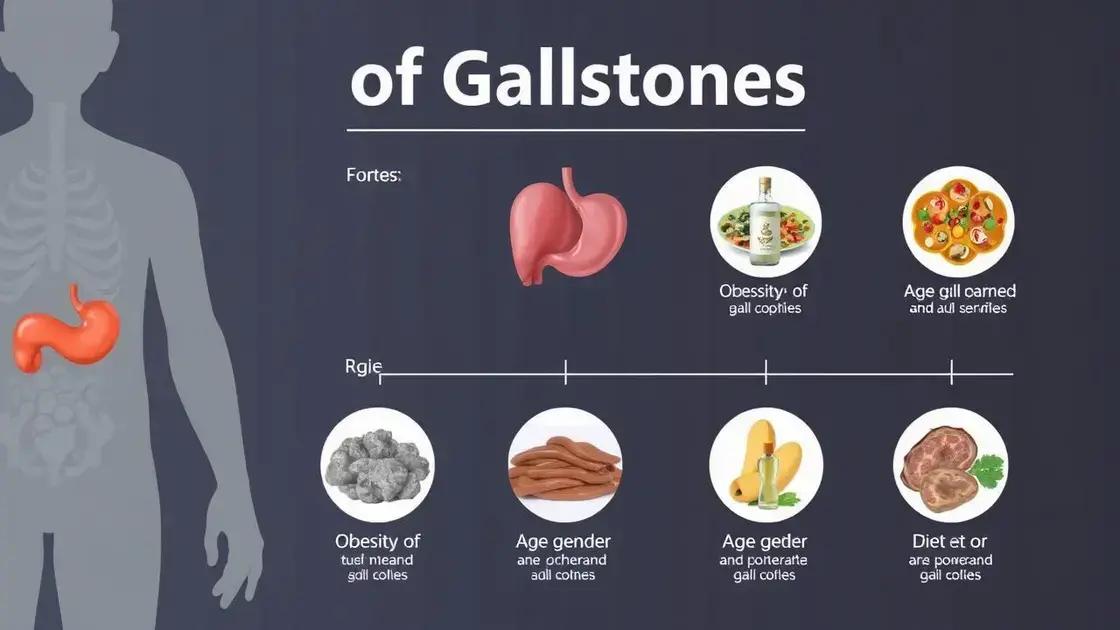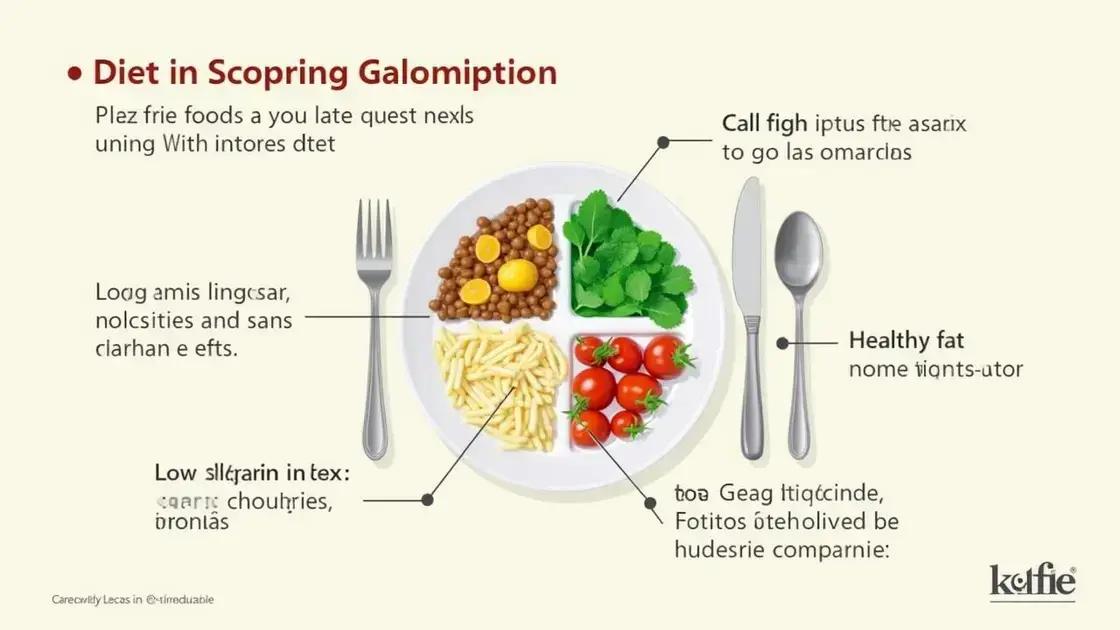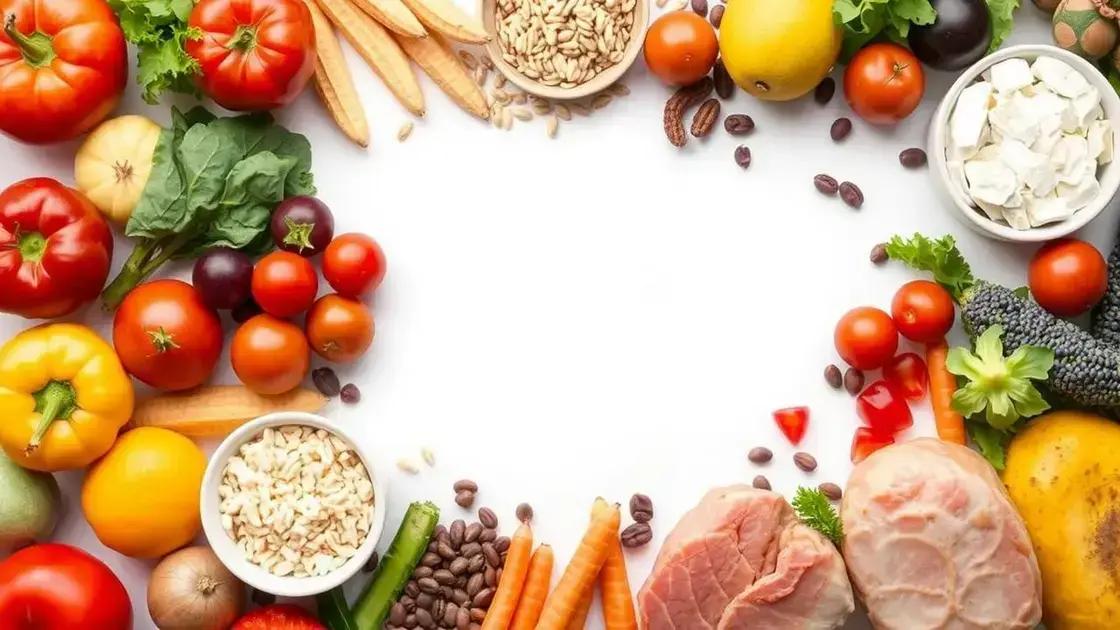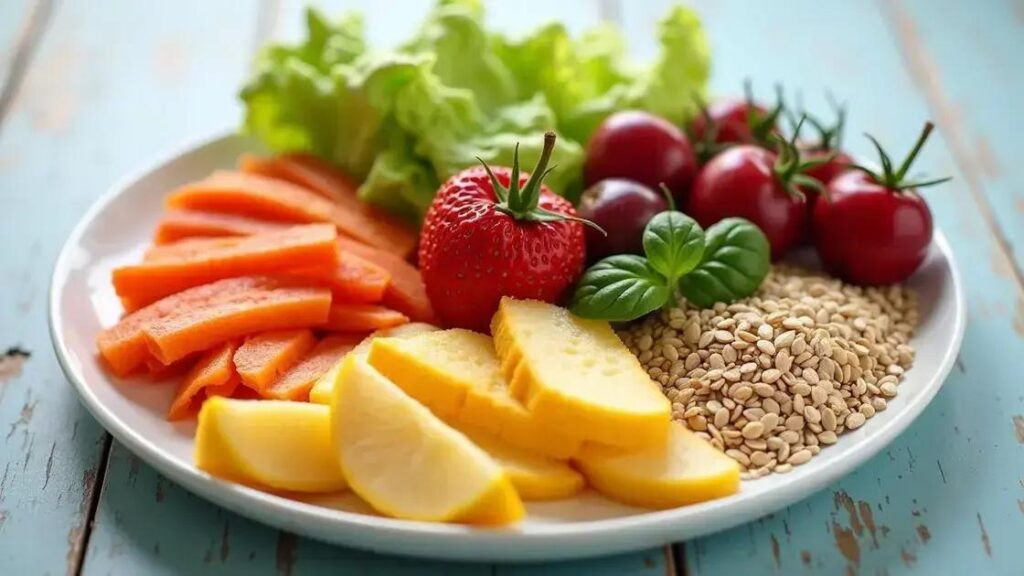To lower your risk of gallstones, focus on a balanced diet rich in high-fiber foods, healthy fats, and lean proteins, while avoiding trans fats and processed sugars. Implement practical dietary changes by starting slowly, planning meals, and staying hydrated, as these habits can significantly improve gallbladder health.
Gallstones can be a painful and inconvenient condition, but many people may not know that their diet plays a crucial role in prevention. How to lower your risk of gallstones with a balanced diet involves making informed food choices that support your digestive health. In this article, we will discuss the causes of gallstones, the impact of diet, and practical steps you can take to reduce your risk. Discover which foods to eat and how to integrate these tips into your daily life, ensuring you enjoy your meals while prioritizing your well-being.
Understanding Gallstones and Their Causes

Gallstones are hardened deposits that can form in the gallbladder, affecting many individuals. They come in two main types: cholesterol stones and pigment stones. Cholesterol stones are yellow-green and are the most common, while pigment stones are smaller, darker, and often associated with certain medical conditions.
The formation of gallstones is influenced by several factors. When the body produces too much cholesterol, it can lead to the creation of cholesterol stones. These stones may also form if the bile contains too much bilirubin, a substance produced from red blood cell breakdown. Additionally, inadequate emptying of the gallbladder can contribute to stone formation.
Some common causes of gallstones include:
- Obesity: Excess weight increases cholesterol levels in bile.
- Age: The risk of developing gallstones increases with age.
- Gender: Women are more likely to develop gallstones than men, partly due to hormonal factors.
- Diet: High-fat, high-cholesterol, and low-fiber diets can increase the risk.
- Family History: Genetics can play a significant role in gallstone formation.
Understanding these factors is important in preventing gallstones. By recognizing the causes, individuals can take proactive steps to lower their risk. As we delve deeper into how diet plays a role in gallstone prevention, it becomes clear that making healthy food choices is essential.
The Role of Diet in Gallstone Prevention

A healthy diet plays a crucial role in preventing gallstones. What you eat can greatly influence the formation of these painful stones. By understanding the connection between diet and gallstone prevention, you can make choices that support your gallbladder health.
Some key dietary factors include:
- High Fiber Intake: Foods rich in fiber, such as fruits, vegetables, and whole grains, can help maintain a healthy digestive system. Fiber aids in digestion and helps regulate cholesterol levels.
- Healthy Fats: Incorporating healthy fats, like those found in olive oil, avocados, and nuts, can support gallbladder function. Avoid trans fats and limit saturated fats, as they can elevate cholesterol levels.
- Maintain a Healthy Weight: Obesity is a significant risk factor for gallstones. A diet that supports weight loss or maintenance, through balanced meals and portion control, can help reduce your risk.
- Low Glycemic Index Foods: Foods that have a low glycemic index, such as legumes and whole grains, can help control blood sugar levels and reduce the risk of gallstones.
Additionally, staying hydrated is important. Drinking plenty of water helps your body function properly and can support overall digestive health. Avoiding rapid weight loss through extreme diets can also protect against gallstone formation, as rapid changes in weight can disrupt your body’s balance and lead to stone development.
Incorporating these dietary practices into your daily routine can significantly lower your risk of developing gallstones. Remember to enjoy a variety of foods and make gradual changes for lasting health benefits.
Foods to Include for a Balanced Diet

To maintain a balanced diet that can help lower your risk of gallstones, incorporating a variety of foods from different food groups is essential. Here are some key foods to include in your daily meals:
- Fruits: Fresh fruits like apples, pears, and berries are high in fiber and can improve digestion. They also provide essential vitamins and antioxidants.
- Vegetables: Leafy greens such as spinach, kale, and broccoli are packed with nutrients. Include a variety of colorful vegetables to ensure you get a wide range of vitamins and minerals.
- Whole Grains: Foods like brown rice, quinoa, and whole grain bread are excellent sources of fiber. They help regulate digestion and keep you feeling full longer.
- Legumes: Beans, lentils, and peas are rich in protein and fiber. They can be a great substitute for meats in meals and help lower cholesterol levels.
- Healthy Fats: Incorporate sources of healthy fats such as avocados, nuts, seeds, and olive oil. These fats support gallbladder health and improve cholesterol levels.
- Lean Proteins: Choose lean protein options like chicken, turkey, fish, and tofu. These proteins can be beneficial without adding excessive fat.
Try to limit processed foods, sugary snacks, and high-fat meats. Instead, focus on fresh, whole foods. Keeping a variety of these foods in your diet can help promote better overall health and potentially reduce your risk of developing gallstones.
Practical Tips for Implementing Dietary Changes

Making changes to your diet can be challenging, but with some practical tips, it can be easier. Here are several strategies to help you implement dietary changes effectively:
- Start Slowly: Make small changes to your diet instead of overhauling it all at once. For example, add one serving of fruit or vegetables to each meal.
- Plan Your Meals: Create a weekly meal plan that includes healthy ingredients. This helps you stay on track and avoids unhealthy choices when you’re hungry.
- Read Labels: Pay attention to food labels. Look for whole grains, low added sugars, and low saturated fat options. This can guide you in making better food choices.
- Cook at Home: Preparing meals at home allows you to control what goes into your food. Experiment with new recipes that include healthy ingredients.
- Keep Healthy Snacks: Have healthy snacks like nuts, fruits, or yogurt on hand. This can help you resist the temptation of junk food when you need a quick bite.
- Stay Hydrated: Drinking plenty of water throughout the day is important. Sometimes thirst can feel the same as hunger.
- Seek Support: Share your goals with family and friends. They can offer encouragement and even join you in making healthier choices.
By following these tips, you can make gradual and beneficial changes to your diet that can help lower your risk of gallstones. Remember, consistency is key to achieving long-lasting results.
In Summary: Eating Right for Gallstone Prevention
A balanced diet plays a vital role in lowering your risk of gallstones. By understanding the causes and implementing dietary changes, you can make informed choices that promote your overall health.
Incorporating high-fiber foods, healthy fats, and lean proteins while staying hydrated can significantly impact your gallbladder health. Practical tips such as meal planning and keeping healthy snacks within reach can facilitate these dietary adjustments.
Remember, making gradual changes is more sustainable than going on a strict diet. By following these guidelines, you are taking proactive steps towards a healthier lifestyle and reducing your risk of gallstones.
FAQ – Frequently Asked Questions about Lowering Your Risk of Gallstones
What are gallstones?
Gallstones are hardened deposits that form in the gallbladder, often made of cholesterol or bilirubin, which can cause pain and digestive issues.
How can a balanced diet reduce the risk of gallstones?
A balanced diet rich in fiber, healthy fats, and lean proteins can help maintain healthy cholesterol levels and promote good digestion, reducing the risk of gallstones.
What types of foods should I include in my diet?
Include fruits, vegetables, whole grains, legumes, lean proteins, and healthy fats like avocados and olive oil to support gallbladder health.
What practical tips can help implement dietary changes?
Start by making small changes, plan meals weekly, read food labels, cook at home, keep healthy snacks available, and stay hydrated.
Is it necessary to avoid all fats in my diet?
No, it’s important to include healthy fats in moderation. Avoid trans fats and limit saturated fats to promote gallbladder health.
How can I stay motivated to maintain dietary changes?
Set realistic goals, seek support from friends and family, and celebrate small successes to stay motivated in your dietary journey.













